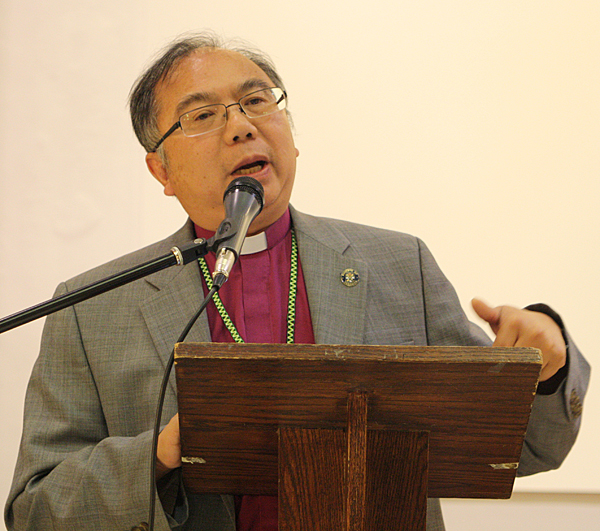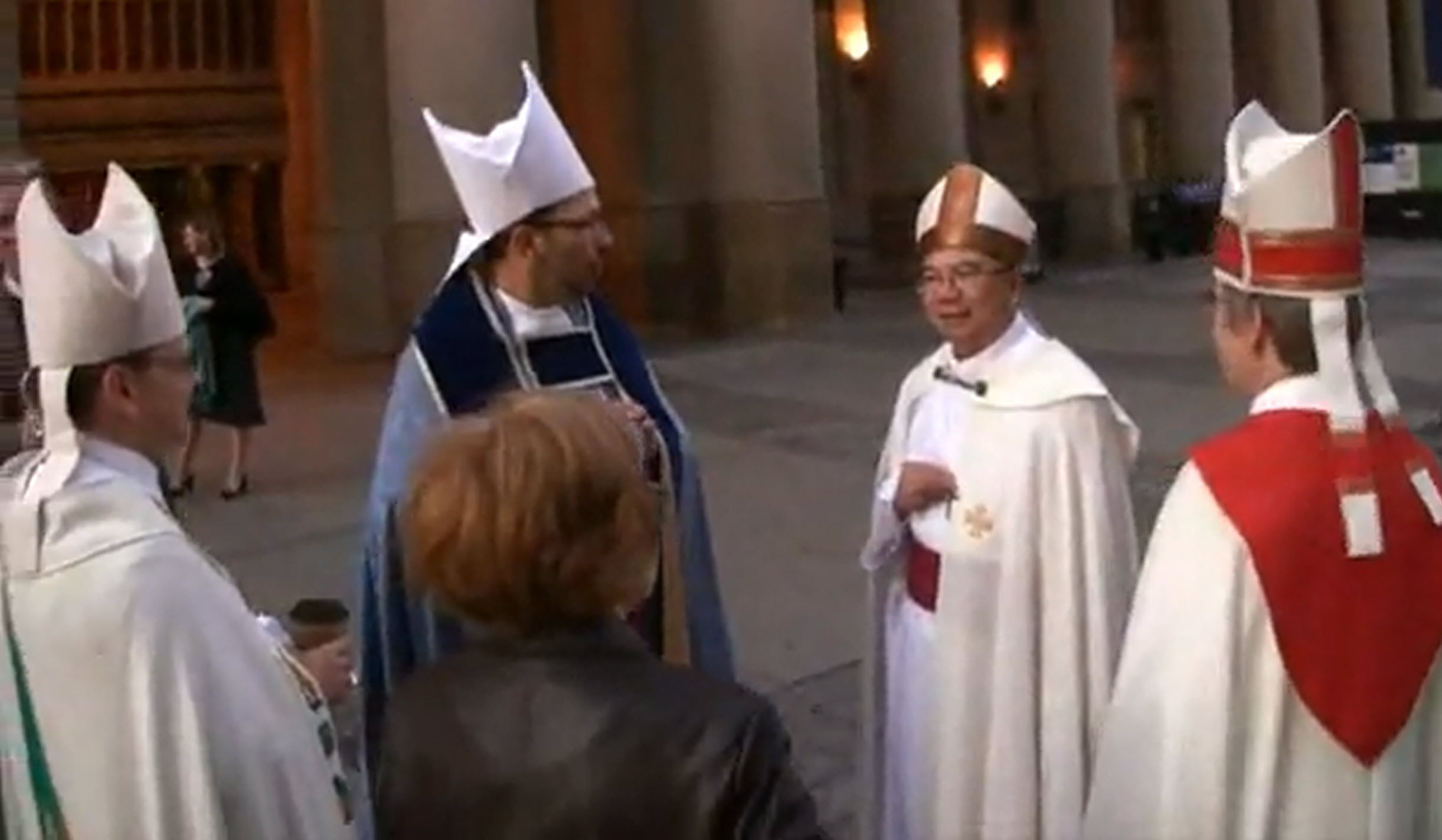Bishop Patrick Yu is a bishop in the Diocese of Toronto. He is a self-proclaimed conservative bishop who has decided to stay put in the Anglican Church of Canada.
He spoke towards the end of the Toronto Back to the Anglican Future Conference and Sue Careless, Senior Editor at the Anglican Planet, recorded and transcribed what he said. She kindly gave permission to post his remarks here.
You can draw your own conclusions about Bishop Yu’s remarks, so I will confine myself to just one thing that struck me:
In the second paragraph Bishop Yu laments the limited theological diversity of those attending the conference and in paragraph six, perhaps forgetting what he said in paragraph two, laments the presence of “people ordained by other communions sitting in this room [who] still tend to plant churches in Toronto”. Evidently a diversity too far.

Bishop Patrick Yu. Photo: Sue Careless
On Sept. 18th when Dr George Sumner, Principal of Wycliffe College, opened the last ten minutes of the Back to the Anglican Future Conference to a question-and-answer period, Patrick Yu, the area bishop for York Scarborough in the Diocese of Toronto, stepped up to the podium at St. Paul’s Anglican Church on Bloor Street and used the full ten minutes to deliver the following comments:
I would like to speak on a point of privilege.
This conference is not as geographically and theologically as diverse as the Toronto Congress [of 1963] was. I wish it was more theologically diverse.
In this Diocese [of Toronto] people are not judged or driven out by their theological convictions. We have canons and even bishops who self-identify as conservatives. I was a founding member of Fidelity, a group set up to have a conservative discussion about homosexuality. Paul Feheley was the vice-president and we still have our jobs. [Feheley is currently Principal Secretary, Primate’s Office of the Anglican Church of Canada.] I do not want any students or clergy or international guests to think that here in the Diocese of Toronto we persecute conservatives.
The question was asked: “How can we support conservatives? I have two comments. I would like to question the definition of the word ‘orthodox’. Are there only 1,000 orthodox priests in the United States? I known they are in a bad way but surely there are more than that? We can define orthodoxy in terms of one’s belief in the Trinitarian formularies of the Church, in one’s commitment to Christ, in adherence to the Scriptures, and the historical creeds. But I have been guilty in the past of putting those who disagree with me theologically as unorthodox. As someone has said, “Orthodoxy is my doxy and heterodoxy is your doxy.” I have met unfortunately unorthodox conservatives as well as orthodox liberals and the converse is also true.
I have personally suffered as a conservative who did not leave the church and there was guilt by association internationally. I think that when we castigate people in the United States and Canada or both if you are there [staying in the church] you must be in the ranks of sinners. It makes conservatives who decide to stay in this church very fearful.
I am the first Chinese bishop and the only one in Canada and I must say that all of the four Chinese churches in Toronto have adopted a conservative stance towards the issue of homosexuality. And it is to their great surprise, disdain and anger when someone ordained a bishop from the Province of Rwanda comes without their knowledge and begins to lure their parishioners away. And I understand that other people ordained by other communions sitting in this room still tend to plant churches in Toronto. That does not help conservatives who stay in the church. And as speaker once said: “If we are not at the table, we cannot contribute to development in the future.”
Lastly, a lot has been spoken about being victims. I caution you – particularly our international friends – to be very cautious in listening to victim narratives. In Canada victim narrative is one of the most powerful political forces around. Our gay and lesbian friends have used this narrative very powerfully and very successfully. For those who attempted to claim victim it is a very tempting short-term tool but in the long term it is very damaging. It helps you to think of yourself as always the outsider. My counsel is to go into the church and act as if you own it, because it is your church. This church is for conservatives and liberals. My mentor Professor Oliver O’Donovan who was one of the authors of the St Andrews Day statement said: “We invite everyone who confesses the Trinitarian formularies of the Church into this discussion.” So when we protest about being excluded, let us be aware not to exclude others from the conversation.
I also speak as the convener of the Evangelism and Church Growth Initiative of the Anglican Communion. Now it is called Anglican Witness. I have to say that people’s experience of Lambeth [2008] was very different. I agree with Archbishop Ian Ernest that evangelism is a difficult topic here as well as in your diocese. When people think about Lambeth they think about sex. Actually the other issue that was very prominent in the report of the indaba discussions was the strong commitment to evangelism. My organization was a follow-up of that.
Let me share with you my own five years of involvement in that organization. When you talk of evangelism with people from Nigeria and Canada and Solomon Islands and South Africa and Burundi there is very little disagreement even though our perspectives on certain theological issues must be very different. So it seems to me we can talk about the Anglican Communion in terms of its organization, and indeed in terms of its issues and problems but when we do that we would commit our resources in a certain way. But if we commit our resources in terms of evangelism and mission, it seems to me that the things that divide us, the problems that seem intractable, may not be so intractable after all.
I’m very glad that Justin Welby spoke to us. We met in London… He said: “I have only two priorities for my archepiscopate. One is reconciliation and the other is evangelism.” My prayer for the Communion is not overcoming [differences] as that seems more difficult but with our differences and with our imperfect instruments we will take into account and deeply embrace the mission and evangelism that is God’s call to us. Then we may discover that we have a Communion after all. God bless you and that’s my response of my privilege.
***
Dr. Sumner then concluded with: “Part of our hope is free exchange, hearing and being heard, candor, parrhesia, free expression. That is certainly our goal at Wycliffe College: theological reflection with a free expression of views. That is a good thing. Our promise was 9pm. Our time is done.”
Like this:
Like Loading...




 From
From